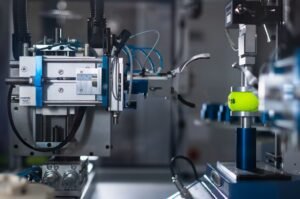Is Artificial Intelligence Software Engineering?
Artificial Intelligence (AI) has been a hot topic of discussion in recent years, with advancements in machine learning algorithms and data processing power. But what does AI mean for software engineering? Is it revolutionizing the way we build software? In this article, we will explore the intersection of AI and software engineering to gain a better understanding of their relationship.
Key Takeaways:
- Artificial Intelligence (AI) is reshaping the field of software engineering.
- AI-powered software development tools can automate repetitive tasks.
- Machine learning algorithms can aid in software testing and debugging.
- AI is not replacing human software engineers but augmenting their capabilities.
**Artificial Intelligence**, as the name suggests, refers to the intelligence demonstrated by machines or computer systems. In the context of software engineering, AI techniques and tools are used to automate various tasks involved in the software development lifecycle. *These range from code generation and code completion to automating testing and bug identification.* AI can assist software engineers in speeding up processes, enhancing code quality, and improving overall productivity.
One significant area where AI is making a significant impact in software engineering is **automating repetitive tasks**. Software engineers often spend a considerable amount of time on mundane and repetitive tasks, such as writing boilerplate code, searching for libraries and documentation, or debugging common issues. With the help of AI-powered software development tools, these tasks can be automated, allowing engineers to focus on more critical and creative aspects of software development.
AI in Software Testing and Debugging
Software testing and debugging are crucial steps in the software development lifecycle. **Machine learning** algorithms can aid in automating these processes by analyzing large sets of data, identifying patterns, and predicting potential bugs or vulnerabilities. This can significantly reduce the time and effort required for manual testing and improve the accuracy of bug detection. *By leveraging AI, software engineers can enhance the reliability and robustness of their applications.*
AI-Powered Code Completion and Optimization
Writing efficient and optimized code is essential for building high-performing software applications. **AI-powered code completion** tools analyze existing codebases, learn from patterns and best practices, and suggest code snippets or improvements while developers write code. This can help reduce coding errors, improve code readability, and ultimately optimize software performance. *With AI-powered code completion, software engineers can write code more efficiently and deliver higher-quality software.*
Data Science and AI in Software Engineering
Data science and AI have been closely related fields, and their integration into software engineering has opened up new possibilities. **Data-driven software engineering** leverages AI techniques to analyze large volumes of data generated during the software development process. This data can provide valuable insights into team collaboration, coding patterns, and software maintenance, enabling software engineers to make data-informed decisions and continuously improve their development practices.
Tables with Interesting Info
| AI-Powered Tools | Benefits |
|---|---|
| Automated Code Generation | Reduces development time |
| Automated Testing | Improves software reliability |
| Code Optimization | Enhances software performance |
| Machine Learning in Software Engineering | Applications |
|---|---|
| Bug Detection | Automated identification of bugs in software |
| Code Analysis | Identifying coding patterns and best practices |
| Software Testing | Automating testing processes and predicting failures |
| Data-Driven Software Engineering | Advantages |
|---|---|
| Insights into Team Collaboration | Improved collaboration and communication |
| Coding Patterns Analysis | Identifying common coding pitfalls and areas for improvement |
| Software Maintenance | Data-driven decision making for maintenance activities |
The Future of AI and Software Engineering
As AI continues to advance, its impact on software engineering will only grow. **Software engineers**, equipped with AI-powered tools and techniques, will have the ability to build more innovative and efficient software. The future of AI and software engineering lies in a seamless collaboration between humans and machines, where AI augments human capabilities and takes care of mundane tasks, allowing software engineers to focus on solving complex problems and driving software innovation.

Common Misconceptions
Artificial Intelligence Software Engineering
There are several common misconceptions surrounding the topic of Artificial Intelligence (AI) Software Engineering. These misconceptions can lead to misunderstanding and confusion. Let’s explore three of them:
- AI can think and reason like a human
- AI will replace human jobs entirely
- AI is infallible and error-free
Firstly, a common misconception about AI is that it can think and reason just like a human. While AI systems can be highly advanced, they operate on algorithms and mathematical calculations that are entirely different from human reasoning. AI is designed to simulate human-like behavior, but it is not capable of genuine human thought. It lacks emotions, intuition, and creativity which are inherent to human intelligence.
- AI systems are based on algorithms, not human cognition
- AI lacks emotional intelligence and creativity
- AI is designed to simulate human-like behavior, not replicate it
Another common misconception is that AI will replace human jobs entirely. While it’s true that AI technology can automate repetitive tasks and improve efficiency, it is unlikely to fully replace human workers. Instead, AI is more likely to augment human capabilities and create new job opportunities that require collaboration between humans and machines.
- AI automation improves efficiency, but not necessarily job replacement
- AI is more likely to augment human capabilities
- AI creates new job opportunities that require collaboration with humans
Lastly, there is a misconception that AI is infallible and error-free. The reality is that AI systems are not perfect and are prone to biases and errors. The data used to train AI systems can introduce biases that may lead to unfair outcomes. Additionally, AI algorithms can make mistakes or generate incorrect predictions, especially in complex and unpredictable situations. It is important to understand that AI is a tool that requires careful design, testing, and ongoing monitoring to mitigate these issues.
- AI systems can be biased and prone to errors
- Data used to train AI can introduce biases
- AI algorithms can make mistakes, especially in complex situations

The Rise of Artificial Intelligence
With rapid advancements in technology, artificial intelligence (AI) has become a prominent field in the software engineering industry. AI software is designed to simulate intelligent human behavior and has found applications in various sectors, including healthcare, finance, and transportation. This article explores the fascinating progress made in AI software engineering through ten compelling tables.
Table: AI Software Engineering Innovations
This table showcases some notable innovations in AI software engineering. From chatbots to machine learning algorithms, these developments have revolutionized how AI is utilized in different domains.
| Innovation | Description |
|——————-|———————————————–|
| Chatbots | AI-powered virtual assistants for human interaction. |
| Deep learning | AI algorithms inspired by the human brain’s neural networks. |
| Computer vision | AI systems that can interpret and understand visual data. |
| Natural language processing | AI techniques that enable machines to understand and respond to human language. |
| Predictive analytics | AI algorithms that predict future outcomes based on historical data. |
Table: Impact of AI on Healthcare
AI has made significant contributions to the healthcare industry, enabling more precise diagnoses, improved patient care, and faster drug discovery. This table highlights a few ways AI is transforming healthcare.
| Application | Impact |
|——————|———————————————–|
| Medical imaging | AI algorithms enhance accuracy in interpreting medical images like X-rays and MRIs. |
| Disease prediction | AI-driven models assist in early detection and prediction of diseases. |
| Robotic surgery | AI-powered surgical robots ensure precision and minimize invasiveness. |
| Personalized medicine | AI algorithms analyze patient-specific data to tailor treatment plans. |
| Drug discovery | AI expedites the drug discovery process through virtual screening. |
Table: AI in Finance
The financial sector has embraced AI to automate operations, detect fraud, and improve customer service. This table presents various applications of AI within the finance industry.
| Application | Description |
|——————–|———————————————–|
| Algorithmic trading | AI algorithms execute trades based on predefined rules and patterns. |
| Fraud detection | AI systems identify fraudulent activities and alert financial institutions. |
| Customer service | AI chatbots assist customers with banking queries, account management, etc. |
| Risk assessment | AI models analyze data to assess and predict potential financial risks. |
| Credit scoring | AI algorithms evaluate creditworthiness based on individual profiles. |
Table: AI in Transportation
The transportation industry has utilized AI to develop autonomous vehicles, optimize route planning, and enhance safety. The table below showcases key applications of AI in transportation.
| Application | Description |
|——————–|———————————————–|
| Autonomous vehicles | AI systems enable self-driving cars and trucks for safer and efficient transportation. |
| Traffic management | AI algorithms monitor and manage traffic flow, minimizing congestion. |
| Predictive maintenance | AI analyzes vehicle data to predict maintenance needs, reducing downtime. |
| Supply chain optimization | AI optimizes supply chain operations for faster deliveries and reduced costs. |
| Accident prevention | AI-enabled systems enhance safety by identifying hazardous conditions and providing warnings. |
Table: AI Ethics and Regulations
As AI becomes more pervasive, ethical considerations and regulations are crucial. This table highlights some key ethical concerns and regulations related to AI software engineering.
| Ethical concern | Regulation |
|———————|————————————————|
| Bias in AI algorithms | Regulations to ensure fairness and unbiased decision making. |
| Privacy infringement | Laws protecting individual privacy and data handling. |
| Liability for AI actions | Legal frameworks to assign responsibility in case of AI-related damages. |
| Transparency in AI decision-making | Regulations promoting transparency and accountability in AI systems. |
| Job displacement | Policies to address the impact of AI on workforce and unemployment. |
Table: Impact of AI on Education
AI has transformed the field of education by personalizing learning experiences, improving assessments, and enabling adaptive tutoring. This table highlights some applications of AI in education.
| Application | Impact |
|——————–|———————————————–|
| Personalized learning | AI tailors educational content to individual students’ needs and abilities. |
| Intelligent tutoring systems | AI provides interactive and adaptive tutoring experiences. |
| Automated assessments | AI algorithms grade assignments and provide immediate feedback. |
| Augmented reality in education | AI-powered AR enhances engagement and interactive learning. |
| Language learning | AI enables immersive language learning through conversation simulations. |
Table: AI Challenges and Limitations
Despite transformative potential, AI software engineering faces challenges and limitations. This table provides insights into some of the obstacles AI researchers and engineers encounter.
| Challenge | Description |
|———————|———————————————–|
| Data quality and quantity | AI performance depends on availability and reliability of data. |
| Ethical dilemmas | Balancing ethical concerns like privacy, bias, and human-AI collaboration. |
| Explainability | AI models must provide explanations for their decision-making processes. |
| Safety and security | Ensuring AI systems are safe, reliable, and protected from cyber threats. |
| Adaptation to changing environments | AI algorithms struggle to adapt to new scenarios and evolving circumstances. |
Table: AI in Entertainment and Gaming
AI has revolutionized the entertainment and gaming industry, enabling realistic simulations and immersive experiences. The table below presents some applications of AI in this domain.
| Application | Description |
|——————–|———————————————–|
| Virtual assistants | AI chatbots provide customized recommendations and suggestions in entertainment. |
| Autonomous NPCs | AI-controlled non-player characters in video games behave intelligently. |
| Gesture recognition | AI recognizes and interprets hand and body movements for augmented reality experiences. |
| Content creation | AI algorithms generate music, scripts, and visual content for media and gaming. |
| Personalized gaming | AI tailors gaming experiences to individual preferences and skill levels. |
Table: AI in Energy and Environment
AI plays a crucial role in addressing energy challenges and minimizing environmental impact. This table highlights some applications of AI in the energy and environmental sector.
| Application | Impact |
|——————–|———————————————–|
| Energy demand forecasting | AI models predict future energy demands for efficient planning. |
| Smart grid management | AI optimizes energy distribution, reduces wastage, and prevents grid failures. |
| Environmental monitoring | AI systems analyze environmental data for pollution detection and conservation efforts. |
| Renewable energy optimization | AI algorithms improve the efficiency and performance of renewable energy sources. |
| Climate change analysis | AI helps analyze vast amounts of climate-related data for accurate predictions. |
Artificial intelligence software engineering has revolutionized various industries, enhancing efficiency, improving decision-making processes, and driving innovation. From healthcare to transportation, education to entertainment, AI’s applications are diverse and transformative. As AI continues to evolve, it will be essential to address ethical concerns, establish regulations, and ensure responsible development and deployment of AI systems. The future holds immense potential for AI software engineering to drive further advancements and positively impact society.
Frequently Asked Questions
Is Artificial Intelligence Software Engineering
FAQs
What is artificial intelligence (AI)?
Artificial intelligence (AI) is a branch of computer science that focuses on creating intelligent machines that can perform tasks that typically require human intelligence, such as speech recognition, decision-making, problem-solving, and learning.





